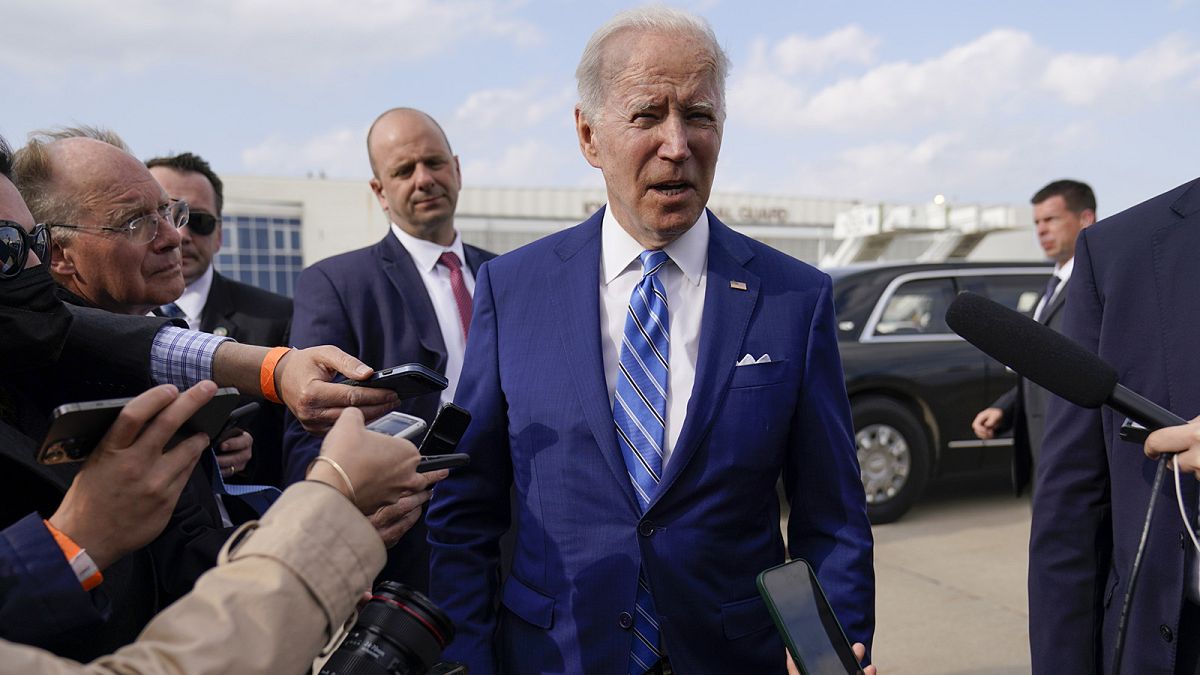Biden added that it would be up to lawyers to decide if Russia’s conduct met the international standard for genocide but said, “it sure seems that way to me”.
President Joe Biden said Russia's war in Ukraine amounted to "genocide", accusing President Vladimir Putin of trying to "wipe out the idea of even being a Ukrainian".
"Yes, I called it genocide," he told reporters in Iowa on Tuesday shortly before boarding Air Force One to return to Washington. "It's become clearer and clearer that Putin is just trying to wipe out the idea of even being a Ukrainian."
At an earlier event in Menlo, Iowa, addressing spiking energy prices resulting from the war, Biden had implied that he thought Putin was carrying out genocide against Ukraine but offered no details.
Neither he nor his administration announced new consequences for Russia or assistance to Ukraine following Biden's public assessment.
Biden's comments drew praise from Ukrainian President Volodymyr Zelenskyy, who had encouraged Western leaders to use the term to describe Russia's invasion of his country.
"True words of a true leader", he tweeted. "Calling things by their names is essential to stand up to evil. We are grateful for US assistance provided so far and we urgently need more heavy weapons to prevent further Russian atrocities."
Genocide label comes with obligation to react
A United Nations treaty defines genocide as actions taken with the "intent to destroy, in whole or in part, a national, ethnic, racial or religious group."
In the past, Western leaders often avoided formally declaring campaigns targeting civilians as genocide, hesitating to trigger an obligation under international convention requiring countries to intervene once genocide is formally identified.
That obligation was seen as blocking former US President Bill Clinton from declaring Rwandan Hutus' killing of 800,000 ethnic Tutsis in 1994 as genocide, for example.
In Bosnia and Herzegovina, the summary executions of over 8,000 Bosniaks in Srebrenica in July 1995 for their nominal Muslim faith were deemed to be genocide only later, as the Bosnian Serb leaders considered responsible for it were sentenced by the International Criminal Tribunal for the former Yugoslavia.
Biden said it would be up to lawyers to decide if Russia's conduct met the international standard for genocide, as Ukrainian officials have claimed, but said, "it sure seems that way to me."
"More evidence is coming out literally of the horrible things that the Russians have done in Ukraine, and we're only going to learn more and more about the devastation and let the lawyers decide internationally whether or not it qualifies," he said.
Just last week, Biden said he did not believe Russia's actions amounted to genocide, just that they constituted "war crimes".
During a trip to Europe last month, Biden faced controversy for a nine-word statement seemingly supporting regime change in Moscow, which would have represented a dramatic shift towards a direct confrontation with another nuclear-armed country. "For God's sake, this man cannot remain in power," Biden said.
He clarified the comments days later, saying, "I was expressing the moral outrage that I felt toward this man. I wasn't articulating a policy change."


